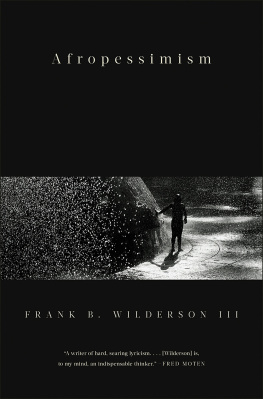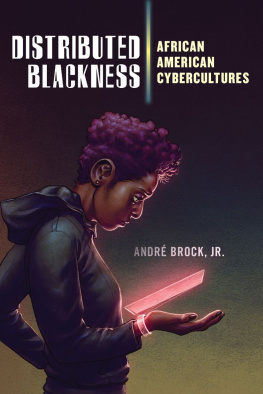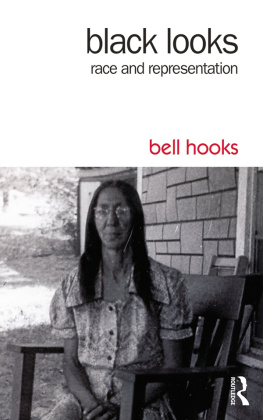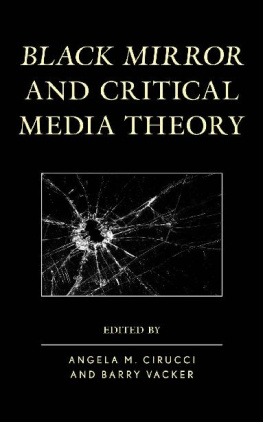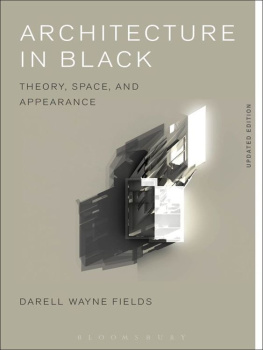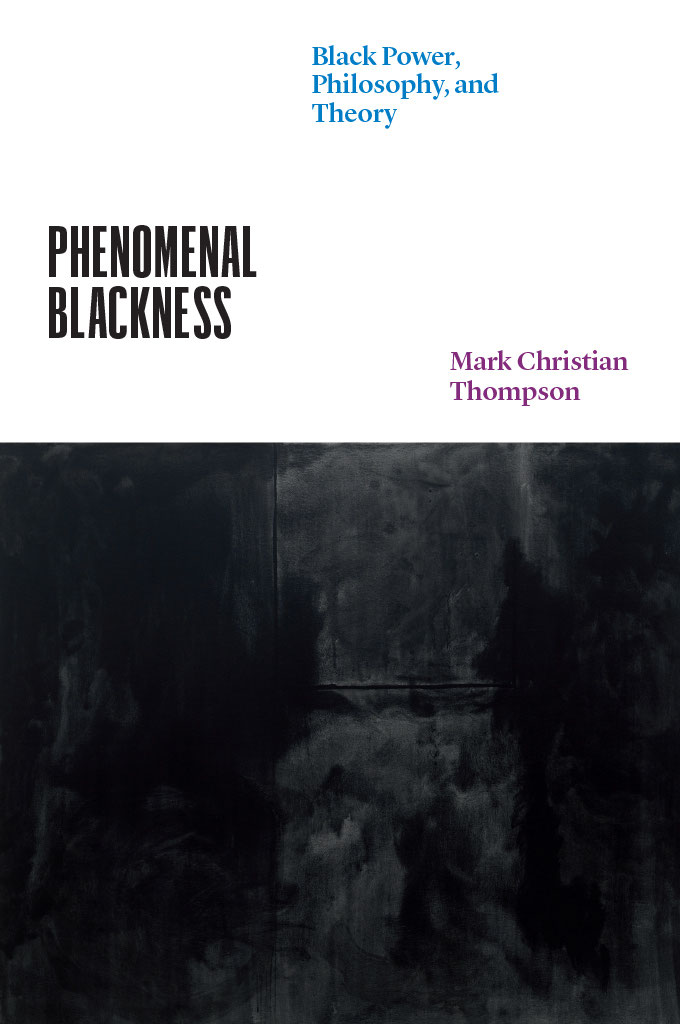
Phenomenal Blackness

Phenomenal Blackness
Black Power, Philosophy, and Theory
Mark Christian Thompson
The University of Chicago Press
Chicago and London
The University of Chicago Press, Chicago 60637
The University of Chicago Press, Ltd., London
2022 by The University of Chicago
All rights reserved. No part of this book may be used or reproduced in any manner whatsoever without written permission, except in the case of brief quotations in critical articles and reviews. For more information, contact the University of Chicago Press, 1427 East 60th Street, Chicago, IL 60637.
Published 2022
Printed in the United States of America
31 30 29 28 27 26 25 24 23 22 1 2 3 4 5
ISBN-13: 978-0-226-81641-8 (cloth)
ISBN-13: 978-0-226-81642-5 (paper)
ISBN-13: 978-0-226-81643-2 (e-book)
DOI: https://doi.org/10.7208/chicago/9780226816432.001.0001
Library of Congress Cataloging-in-Publication Data
Names: Thompson, Mark Christian, 1970 author.
Title: Phenomenal Blackness : Black power, philosophy, and theory / Mark Christian Thompson.
Other titles: Black power, philosophy, and theory | Thinking literature.
Description: Chicago ; London : The University of Chicago Press, 2022. | Series: Thinking literature | Includes bibliographical references and index.
Identifiers: LCCN 2021035773 | ISBN 9780226816418 (cloth) | ISBN 9780226816425 (paperback) | ISBN 9780226816432 (ebook)
Subjects: LCSH: African AmericansIntellectual life20th century. | African American philosophy. | Philosophy, German. | Critical TheoryHistory. | African American aesthetics. | CriticismUnited StatesHistory. | American literatureAfrican American authorsGerman influences.
Classification: LCC E185.89.I56 T47 2022 | DDC 973/.0496073dc23
LC record available at https://lccn.loc.gov/2021035773

This paper meets the requirements of ANSI / NISO Z39.48-1992 (Permanence of Paper).
For my daughter, Geraldine Giovanna
Contents
INTRODUCTION The Essence of the Matter
ONE The Politics of Black Friendship: Gadamer, Baldwin, and the Black Hermeneutic
TWO The Aardvark of History: Malcom X, Language, and Power
THREE Black Aesthetic Autonomy: Ralph Ellison, Amiri Baraka, and Literary Negro-ness
FOUR The Revolutionary Will Not Be Hypnotized: Eldridge Cleaver and Black Ideology
FIVE Unrepeatable: Angela Y. Davis and Black Critical Theory
CONCLUSION Black Aesthetic Theory
ACKNOWLEDGMENTS
NOTES
REFERENCES
INDEX
[ INTRODUCTION ]
The Essence of the Matter
In 1926, W. E. B. Du Bois famously asserted, All art is propaganda and ever must be, despite the wailing of the purists (295). This statement, while open to challenge in its day, was mostly rejected by the generation of African American writers that came to prominence during, and directly following, World War II. Richard Wright would agree in principle with Du Boiss assessment, yet not unconditionally. For Wright, literature made more than ideological claims; it also participated in a history of apolitical aesthetic practices. In disagreeing with Wright, and later in his exchanges with Irving Howe, Ralph Ellison would take this point further, insisting that literatures aesthetic dimension existed independently of propagandistic ends. Like Du Bois and Wright, Ellison was influenced by historical and sociological thought, to which he added a deep investment in anthropological discourse that led him to reach different conclusions than those arrived at by his older colleagues. Reflecting on art in social ritual, Ellison saw literature as sacrificial, finding the aesthetic truth of human relations in their psychologically ritualized, and racialized, social contexts.
As used by Ellison and Zora Neale Hurston, anthropological theory exercised a strong influence on mid-twentieth-century African American literary thought. Along with sociology and Marxism, anthropological discourse provided a basis for African American cultural criticism. While Du Bois, Alain Locke, and others clearly incorporated philosophy in their work, it generally did not become the main mode of cultural criticism and social critique among African American literary theorists until the 1960s. Phenomenal Blackness examines the ideas that lead to this change in analytical method. To be clear: this book does not claim that, before the 1960s, African American cultural critics avoided, or were unfamiliar with, philosophical criticism. Instead, this book maintains that a shift in methodological focus occurred in the early sixties, from sociology and anthropology to philosophy and critical theory. This shift is announced by Amiri Baraka (LeRoi Jones) in his jazz essays of the period and in his 1963 study Blues People: Negro Music in White America , in which he insisted on philosophy as the critical means by which to grasp African American expressive culture.
Baraka insists on this in order to posit an African essence that goes beyond any previous conception of Blackness, to present an ontology of Black being. While more sociologically oriented thought, such as Du Boiss, understood Blackness as a singular set of sociohistorical characteristics, and possibly as a biological singularity, it did not subscribe to the idea that Black being could survive all sociohistorical influence unaltered. Du Bois believed that equitable social assimilation and cultural amalgamation of the races was possible, whereas Baraka did not. To be sure, Baraka relies on social, political, and historical analyses to assert this essential Blackness; yet his work also includes a metaphysics of Black being that requires ontology in addition to sociology, political science, and history. Again, while Du Bois, for example, was deeply influenced by Hegels dialectical method, phenomenology of mind, and philosophy of history, he did not introduce an ontologically singular, independent, atemporal Black being into sociological thought and cultural criticism. Du Boiss intervention was not in metaphysics or ontology. Ralph Ellison did verge on doing this in his blues writings, most notably in the Prologue to Invisible Man (1952). Yet he stopped short of suggesting that an unchangeable Black essence ultimately determined the historical nature of African American blues culture. After LeRoi Jones, as Don L. Lee (Haki Madhubuti) might put it, when thinking literature, African American literary theory is always to some extent thinking Blackness.
Ten years Barakas senior, and ten years younger than Ellison, James Baldwin bridges the literary timeline between the two writers. While Irving Howe openly associated Baldwins literary production with Ellisons modernist, anthropological aesthetic, Baldwins later view, consonant with the younger generation of African American cultural theorists coming to prominence in the midsixties, actually reflected a strong interest in philosophy. This is not to say that Ellison undervalues, misunderstands, or refuses to use philosophy in his work, but rather that, unlike Baldwins, Ellisons criticism displays a much stronger preference for sociology and anthropology. Phenomenal Blackness shows that, when placed in their philosophical contexts, Baldwins literary-critical essays, and those of Black Power writers in the sixties, use a Black hermeneutic to interpret phenomenal Blacknessthe nexus of meaning defining Black being-in-the-world. In identifying phenomenal Blackness as at the center of African American expressivity, these works require an ontological argument and a mode of hermeneutical interpretation appropriate to it. While their initial reliance on Western aesthetic ontology speaks to the unprecedented occasion of this criticism, it still forces early Black Power critics to use the categories and terms of critical theory in order to begin to think against them. Baldwin, Baraka, and others attempt to articulate Black aesthetic ontology beyond Western conceptual and lexical limits, and with these shifts, new, non-Western critical paradigms emerge. Until the late 1960s, however, Black being is explored in Western philosophical terms derived mostly from contemporary German thought.



